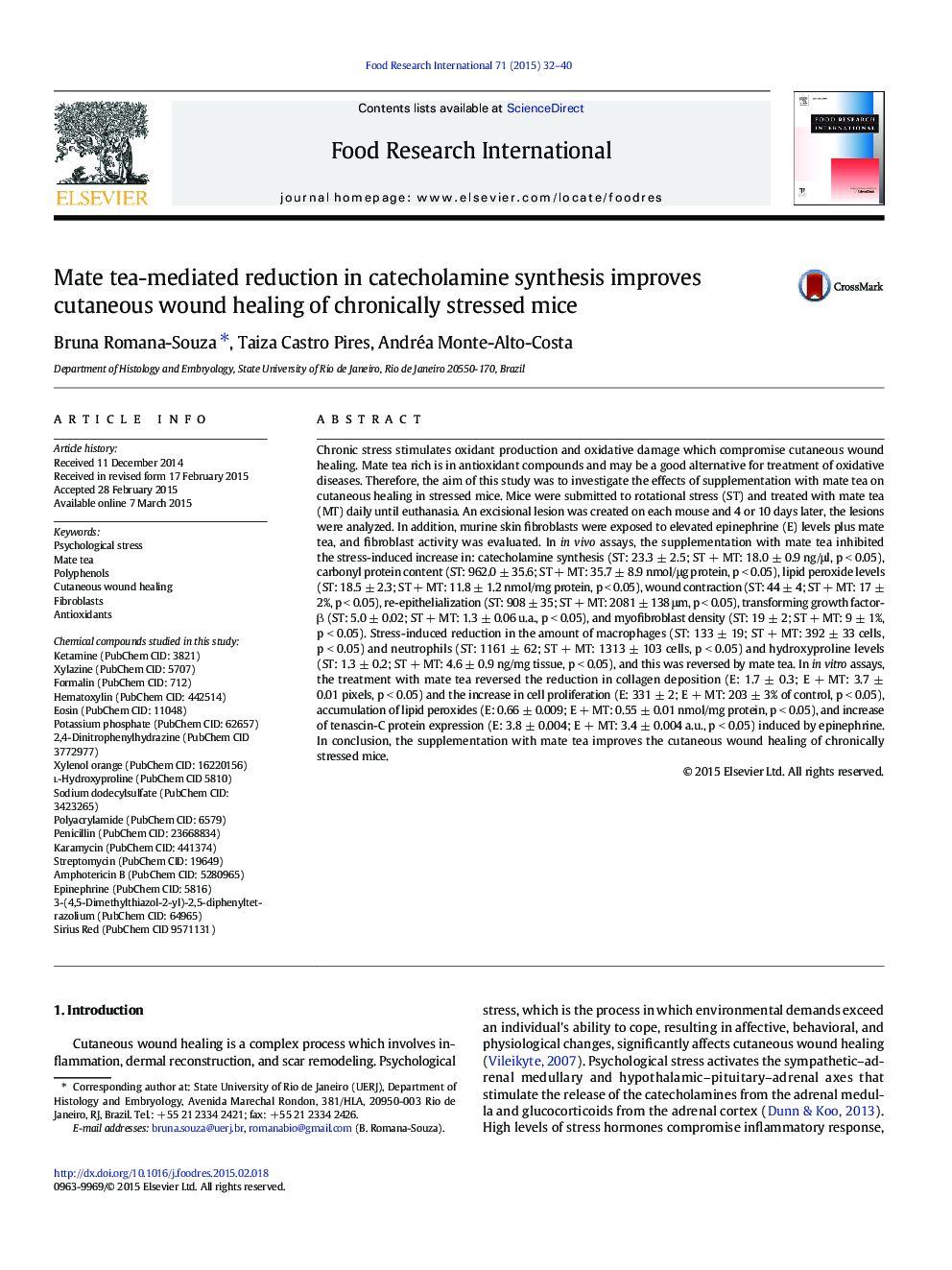| کد مقاله | کد نشریه | سال انتشار | مقاله انگلیسی | نسخه تمام متن |
|---|---|---|---|---|
| 4561537 | 1628475 | 2015 | 9 صفحه PDF | دانلود رایگان |
• We investigate the role of mate tea and chronic stress on skin tissue repair.
• Mate tea decreased catecholamine levels contributing to oxidative damage reduction.
• Mate tea normalized local inflammatory response promoting dermal reconstruction.
• Mate tea inhibited epinephrine-induced reduction of collagen in fibroblast culture.
Chronic stress stimulates oxidant production and oxidative damage which compromise cutaneous wound healing. Mate tea rich is in antioxidant compounds and may be a good alternative for treatment of oxidative diseases. Therefore, the aim of this study was to investigate the effects of supplementation with mate tea on cutaneous healing in stressed mice. Mice were submitted to rotational stress (ST) and treated with mate tea (MT) daily until euthanasia. An excisional lesion was created on each mouse and 4 or 10 days later, the lesions were analyzed. In addition, murine skin fibroblasts were exposed to elevated epinephrine (E) levels plus mate tea, and fibroblast activity was evaluated. In in vivo assays, the supplementation with mate tea inhibited the stress-induced increase in: catecholamine synthesis (ST: 23.3 ± 2.5; ST + MT: 18.0 ± 0.9 ng/μl, p < 0.05), carbonyl protein content (ST: 962.0 ± 35.6; ST + MT: 35.7 ± 8.9 nmol/μg protein, p < 0.05), lipid peroxide levels (ST: 18.5 ± 2.3; ST + MT: 11.8 ± 1.2 nmol/mg protein, p < 0.05), wound contraction (ST: 44 ± 4; ST + MT: 17 ± 2%, p < 0.05), re-epithelialization (ST: 908 ± 35; ST + MT: 2081 ± 138 μm, p < 0.05), transforming growth factor-β (ST: 5.0 ± 0.02; ST + MT: 1.3 ± 0.06 u.a., p < 0.05), and myofibroblast density (ST: 19 ± 2; ST + MT: 9 ± 1%, p < 0.05). Stress-induced reduction in the amount of macrophages (ST: 133 ± 19; ST + MT: 392 ± 33 cells, p < 0.05) and neutrophils (ST: 1161 ± 62; ST + MT: 1313 ± 103 cells, p < 0.05) and hydroxyproline levels (ST: 1.3 ± 0.2; ST + MT: 4.6 ± 0.9 ng/mg tissue, p < 0.05), and this was reversed by mate tea. In in vitro assays, the treatment with mate tea reversed the reduction in collagen deposition (E: 1.7 ± 0.3; E + MT: 3.7 ± 0.01 pixels, p < 0.05) and the increase in cell proliferation (E: 331 ± 2; E + MT: 203 ± 3% of control, p < 0.05), accumulation of lipid peroxides (E: 0.66 ± 0.009; E + MT: 0.55 ± 0.01 nmol/mg protein, p < 0.05), and increase of tenascin-C protein expression (E: 3.8 ± 0.004; E + MT: 3.4 ± 0.004 a.u., p < 0.05) induced by epinephrine. In conclusion, the supplementation with mate tea improves the cutaneous wound healing of chronically stressed mice.
Journal: Food Research International - Volume 71, May 2015, Pages 32–40
